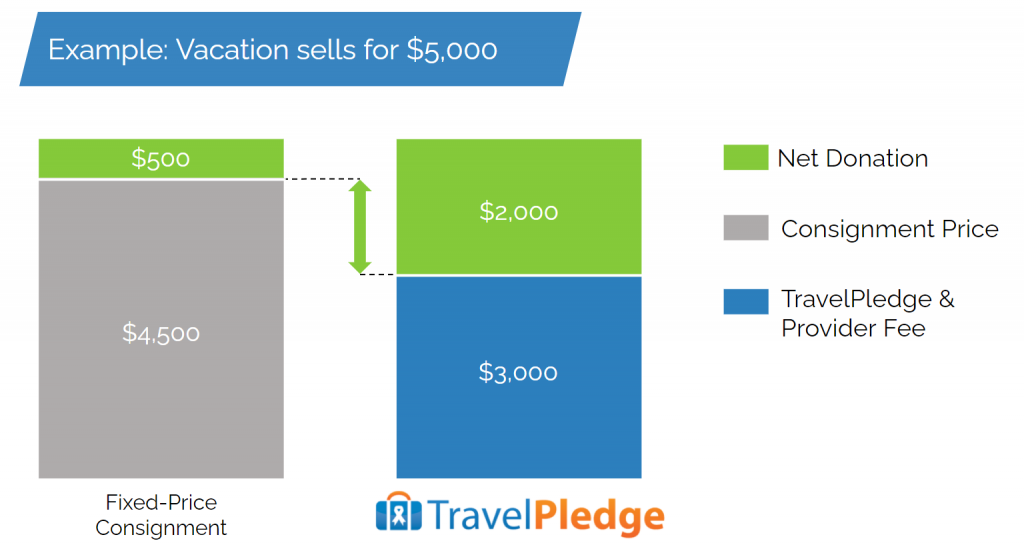We are often asked by nonprofit fundraisers to compare our program to fixed-price consignment auction packages they’ve used in the past. Below we explain fixed-price consignment’s shortcomings and how TravelPledge is different.

What is fixed-price consignment?
“Fixed-price” consignment is an agreement for the auction organizer to pay the consignment item supplier a predetermined price after the item is sold. The goal of the auction organizer is to obtain a winning bid on the consignment item that exceeds their predetermined cost.
For example, if the consignment price is $4,500, and the item sells at the auction for $5,000, then the nonprofit pays the consignment item supplier $4,500 and pockets the remaining $500 as the net donation. If the item does not sell, there is no charge.
Why is fixed-price consignment risky for nonprofits?
On the surface, fixed-price consignment may seem like a great way to augment volunteers’ item procurement efforts. After all, there’s no risk, right?
Well, not exactly.
Fixed-price consignment prices are often quite high. As a result, it is difficult for many auctions to command a winning bid that generates a meaningful donation. We’ve heard horror stories of auctions that lost money on their fixed-price consignment items.
Worse yet, if an expensive consignment item sells at the starting bid, several thousand dollars are sucked out of the room that could’ve been bid on other items.
Thus, although fixed-price consignment items are advertised as “no risk,” the risk is very real.
How is TravelPledge different?
Rather than paying a fixed price, your invoice on a TravelPledge experience is proportional to the size of the winning bid. You can see how this works by using the Donation Calculator on our homepage.
This guarantees that the nonprofit keeps at least 80% of the winning bid on small-ticket items, like golf foursomes:

And 40% to 60% of the winning bid on big-ticket items, like vacations:

Even if the TravelPledge item sold at the starting bid, you’ll still generate a meaningful donation. Additionally, you’ll keep 100% of the winning bid in excess of the retail value.
We’ll ask for you to report the winning bid amount after your event so we can prepare your invoice. See precisely how your invoice is calculated.

How we do it
We partner exclusively with generous business owners who value the promotion they receive at benefit events. As a result, they are willing to donate or partially donate auction packages to nonprofits.
Conclusion
While fixed-price consignment may seem to be “risk free”, nonprofits often lose money after paying the consignment price.
TravelPledge’s unique model is designed so you always generate a meaningful donation when an item sells, even if it sells at the starting bid.



Abbey Shimel
I am interested in learning more about TravelPledge and the difference between fixed consignment. Particularly, what happens if an experience receives no bid at all. Is the organization responsible for paying any out-of-pocket costs?
Al McDonald
Hi Abbey, There is no responsibility on the organization to pay anything if the item doesn’t sell. The chief difference between TravelPledge’s model and fixed price consignment is that the organization makes a meaningful donation even at the starting bid.